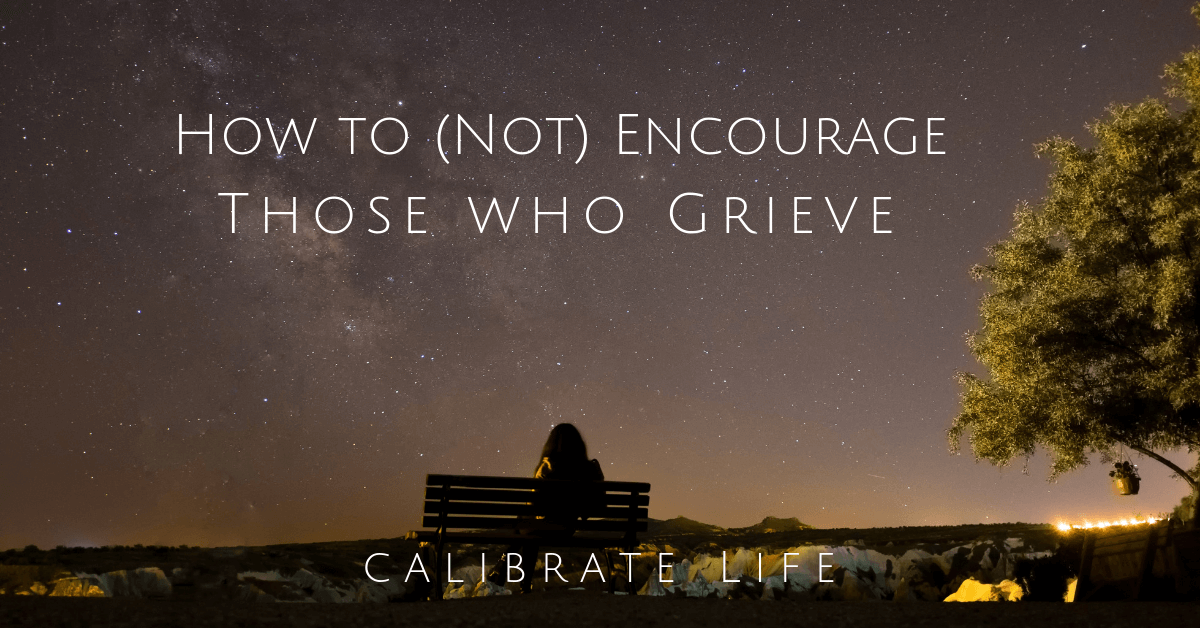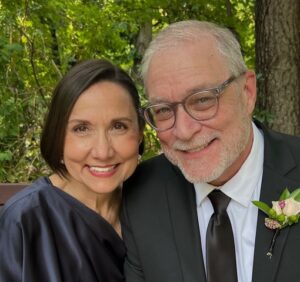Podcast: Play in new window | Download

The grief process is a journey and not a finish line, in fact, depending upon the depth of the relationship with lost loved one, we never “get over it”, but we can be healthy and whole. In this episode of the Calibrate Life podcast, we talk about how to encourage those we love as they journey through grief.
Continue Reading for the Episode Notes…
How to (Not) Encourage Those Who Grieve
We are recording this podcast on Wednesday, November 21, 2018. Right about now, 6 years ago, I was preparing to officiate my wife’s funeral. Over the past 6 years the anniversary of the event has been met with varying emotions, and this year, after 6 years, it has reached a new emotional level, but the pain is still present, and we’ve come to understand in increasing measure, grief has no finish line, it only has levels of health and wholeness.
Since I (David) am the one who drives content creation for Calibrate Life, these topics tend to track with my calendar, but Donna and I both experience these things and regularly talk about them, particularly as we seek to be redemptive with those a bit further back on the grief journey than are we. We are not counselors, the only thing we know is what we have experienced. We acknowledge, everyone is different, every grief journey is different. As always, this is the journey we have observed in ourselves and in others.
So, today we are talking about a few things, though there are most likely hundreds, that may help you as you reach out to those you love and lead on the grief journey.
#1 Grief is a journey without a finish line.
You will never forget or ceased to be moved by the loss of someone with whom you intimately shared decades. Joyful and painful reminders are everywhere.
Our only goal is to progress toward wholeness and health:
- Spiritual Health, because our spiritual perspectives must mature and strengthen us.
- Emotional Health, because this affects the way we feel and process the loss.
- Intellectual Health, because the way we think and the things we learn provide a foundation for our spirituality and our emotions.
- Physical Health, because our physical well-being affects every other area of our lives. Physical health and activity positively affects depression levels.
In lifting those you love and lead while they grieve, do not expect them to “get over it” because that isn’t going to happen, depending upon your definition of “get over it”. Our only hope is coming to a place of wholeness and health.
#2 Understand that it is possible to feel pain and joy at the same time.
When you reach out to someone grieving, realize that your relationship with them enables them to share the pain with you. It does not mean pain and sorrow is the only thing in their lives, it means that they consider you a safe person to share what they can only share with a diminishing number of people in their lives.
I was surprised by my ability in one minute to experience great joy, which sometimes made me feel guilty, and in another moment to experience weeping and great pain.
Do not assume that the griever is not progressing because of the pain they share, and do not assume they are not grieving properly because they are only sharing the upside and the joys of their life with you. Understand that you may only be seeing one part of the picture because of the dynamics of your relationship, either on the pain side or the joy side.
#3 Understand your position in the griever’s relational circles.
We all have levels of relationship. Some are strangers, some are acquaintances, some are friends, and a few are intimate friends.
If you are an intimate friend you can speak intimately. If you are a stranger, or an acquaintance, for the most part, express your condolences and do not try to speak into their pain. You’ve not earned that right and you are not welcome to do so. The exception is when you have experience with the situation and the person ASKS or reaches out to you. Otherwise, just be kind, express your sympathy, and do not attempt to speak to them as an intimate friend.
There are no hard fast rules here, but people lacking self-awareness create severe pain when they insert themselves into another person’s pain.
Stay out of relationship circles to which you have no right nor invitation.
#4 Are you comforting or conversing?
If you are having a conversation it will be two-way. They share their pain, you share yours. For a person early in the grief process, they don’t need a conversation, they need comfort.
The key here is, don’t make it about you. When we comfort we make it about the other person. Your need to tell them about how sad you were when you lost your Pez dispenser in 5th grade does not convince them that you understand loss, it confirms to them that you are yet another person that just doesn’t get it.
When I’ve lost my spouse of 30 years, I don’t care about the anxiety you are feeling because your German Shepherd is 15 years old and you just don’t know how you will handle it when they die. I’m very sorry… apples and oranges to the person who is grieving.
If you are having a conversation… fair game… if you are comforting or ministering to someone, please, for once in your life, make it about them and not about your story that doesn’t fit the situation anyway.
#5 Are you listening or problem solving?
No, God did not “need” another angel. That is not why their loved one died. It may help some to hear such things, but, generally speaking, it is futile to make sense of what is senseless to the griever.
There is a progressive balance between listening and considering solutions. Please, know where your loved one is on the journey and do not offer solutions too quickly. At first, the only solution is for the lost person to come back, and that isn’t going to happen. As their emotional health strengthens, solutions may be needed, but early on it just hurts and not much will fix that.
The balance between listening and problem solving progresses dependent upon 1) the level of relationship, 2) the expertise and insight of the listener, and 3) the progression of the griever in their journey toward embracing health.
Your greatest gift is probably just listening. Listeners diminish as the journey continues, and if you are still listening with the awareness that you cannot fix the loss, you are a rare gift.
#6 Bring it up. Talk about the person they’ve lost. Talk about the loss.
Before my loss I operated on the assumption that if I brought up the loved one’s death I would be opening a healing wound and it would be counter productive. Actually, they never stop thinking about the loss, and as time goes on, it causes sadness that others seemed to have forgotten this very important person who died.
Obviously, don’t be an idiot about it by over doing it, but just letting the grieving person know that you hurt too, and that you remember them in their pain, and you remember the one they lost… just such a very brief comment (depending upon your level of relationship) means a great deal.
A few words to those who grieve…
First, give grace to people who are trying or people who just don’t know what to do or say.
Sometimes people say nothing when they just don’t know what to say. Look beyond their silence and into the relationship and know they care, they just are not skilled in how to approach you.
Give grace to people who transgress their level of relationship and say stupid things. They are just trying to help, receive it in the spirit in which it was intended. When it stings, just say a simple “thank you” and turn and move on.
I will never forget the well meaning man who lost his wife some years earlier, who introduced me to his new wife and said, “God will give you a new wife too.” He was right, and I’m thankful for that reality, but at the moment, I just wanted the old one back.
I just said, “thank you.” That’s all, end of conversation, no further comment. He meant well, he just wasn’t skilled in relationship and communication. I give him grace.
Second, coming up on the holidays, be magnanimous enough to rejoice with those who rejoice and to mourn with those who mourn.
When you go to church on Christmas Sunday Morning and everybody is celebrating and joyful, don’t begrudge them that joy because you are hurting.
You’ve had joy before, you will have joy again.
Give grace and find healing in rejoicing with those who rejoice and mourning with those who mourn.
Finally…
Over the past 6 years we’ve learned to TRUST God in a way we could not have before our loss. We do not understand loss long before its natural time. Loss is very much a part of life. Losing people we love is very common. We were not singled out, we were not being punished, God was not unfaithful. We live, we die, we go to be with Jesus. That is the plan.
This is more solace than it is consolation. We still don’t try to understand, but we embrace God’s path for our lives and we trust God’s path to take us to the places we need to be.
As you lift those you love and lead who are on a grief journey, especially during the holidays when everything reminds us of family and what once was, just love them… that’s all… just love them and listen and take your cues from them. If you watch and listen, they will communicate how you can best lift them.
Thanks for caring, and thanks for faithfully reaching out.
If you would like to comment on this post, we would welcome your feedback on our



